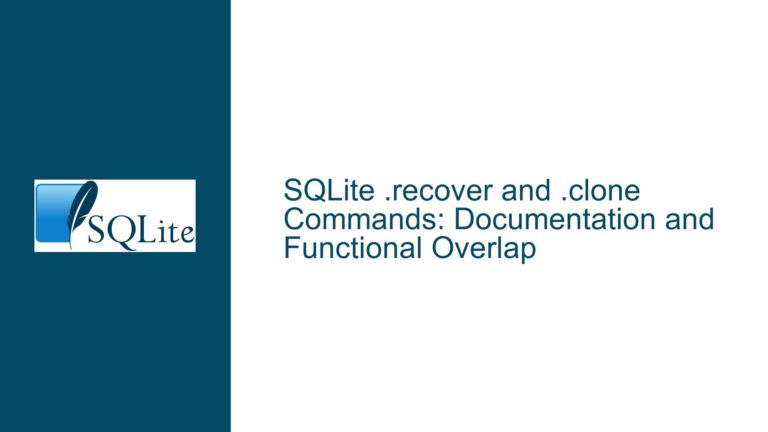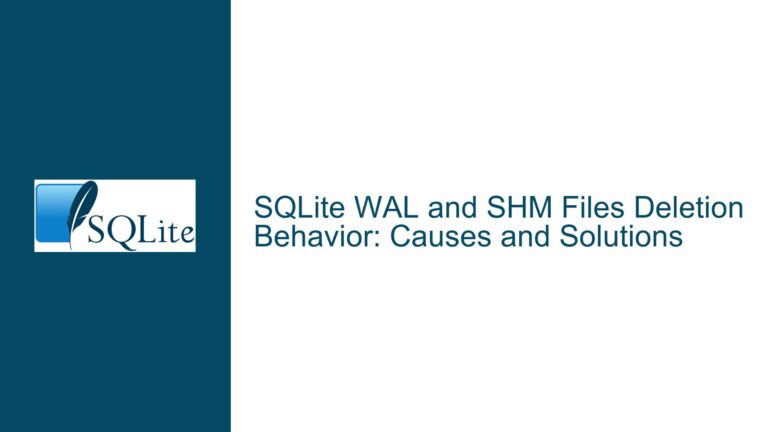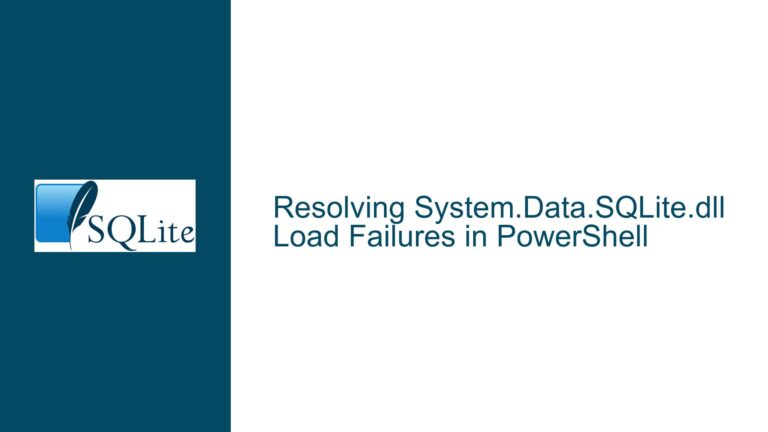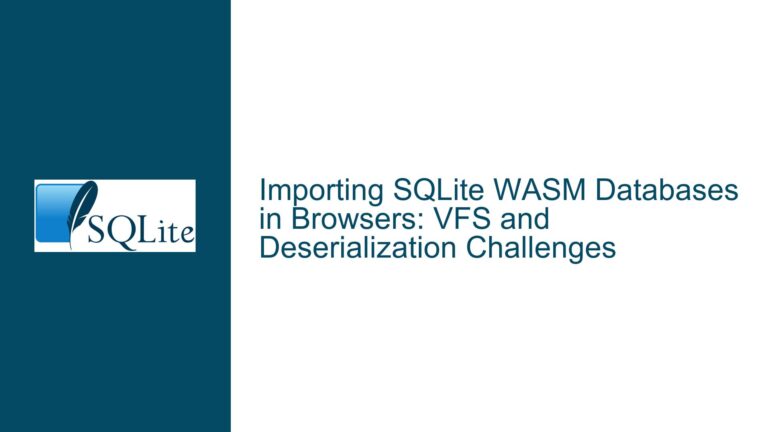SQLite CLI –init Behavior Change and Silent Initialization Issue
SQLite CLI –init Error on File Open Failure in Version 3.34.0
In SQLite version 3.34.0, a significant change was introduced to the behavior of the --init option in the SQLite Command Line Interface (CLI). Previously, users could pass an empty string (--init "") to the --init option to avoid any initialization, which was particularly useful in shell scripts where silent operation was required. However, starting with version 3.34.0, passing an empty string to --init results in an error message being emitted if the file cannot be opened. This change has introduced a challenge for users who rely on the CLI in automated scripts, as the error message can disrupt the expected flow of operations.
The --init option is designed to load and execute SQL commands from a specified file at the start of the SQLite CLI session. This is commonly used to set up the environment, configure settings, or load data before the user or script begins interacting with the database. The ability to suppress initialization entirely by passing an empty string was a convenient feature for scenarios where no initialization was desired. However, the new behavior enforces a stricter check on the file argument, leading to an error if the file cannot be opened, even if the intention was to skip initialization.
This change has led to two primary issues. First, the error message emitted when an empty string is passed to --init can cause problems in shell scripts where silent operation is critical. Second, while using /dev/null (or nul on Windows) as the argument to --init avoids initialization, it still emits a status message (-- Loading resources from /dev/null) to standard error (stderr), which can also interfere with script execution.
Interrupted Silent Initialization Due to Stricter File Handling
The root cause of this issue lies in the stricter file handling introduced in SQLite 3.34.0. Prior to this version, the --init option would silently ignore an empty string argument, effectively skipping initialization without any output. This behavior was useful in scenarios where users wanted to ensure that no initialization occurred, particularly in automated scripts where any extraneous output could disrupt the script’s logic.
With the new behavior, SQLite now attempts to open the file specified by the --init option, and if the file cannot be opened (including the case where an empty string is provided), an error message is emitted. This change was likely introduced to improve the robustness of the CLI by ensuring that users are aware of potential issues with the initialization file. However, this has inadvertently broken existing workflows that relied on the old behavior.
The use of /dev/null (or nul on Windows) as a workaround to avoid initialization is a common technique in Unix-like systems. /dev/null is a special file that discards all data written to it and returns an end-of-file (EOF) condition when read. When used with --init, SQLite reads from /dev/null, which results in no initialization commands being executed. However, the CLI still emits a status message indicating that it is loading resources from /dev/null, which can be problematic in scripts that expect no output.
The stricter file handling in SQLite 3.34.0 also affects other edge cases, such as when the specified file does not exist or is inaccessible due to permissions. In these scenarios, the CLI will emit an error message, which can be disruptive in automated environments. This change highlights the importance of understanding the behavior of command-line tools in different versions and the potential impact of seemingly minor changes on existing workflows.
Implementing -batch Mode and Proposing a –noinit Option
To address the issue of unwanted output when using the --init option, users can employ the -batch mode in the SQLite CLI. The -batch option is designed to suppress status messages and other non-essential output, making it suitable for use in scripts where silent operation is required. When combined with --init /dev/null, the -batch option prevents the status message (-- Loading resources from /dev/null) from being emitted, effectively achieving silent initialization.
For example, on Linux, the following command can be used to run SQLite in batch mode with initialization suppressed:
sqlite3 -init /dev/null -batch <from >to
On Windows, the equivalent command would be:
sqlite3 -init nul -batch <from >to
In both cases, the -batch option ensures that no status messages are printed to stderr, allowing the script to run without interruption. However, it is important to note that -batch does not suppress error messages related to the inability to open the file specified by --init. Therefore, if the file cannot be opened (e.g., due to a permissions issue), an error message will still be emitted.
While the -batch option provides a workaround for the issue, it is not a perfect solution. The need to use /dev/null (or nul on Windows) and the -batch option together adds complexity to the command, and it may not be immediately obvious to users why this combination is necessary. Additionally, the -batch option suppresses all status messages, which may not be desirable in all scenarios.
A more elegant solution would be to introduce a --noinit option to the SQLite CLI. This option would explicitly indicate that no initialization should be performed, without requiring the use of /dev/null or -batch. The --noinit option would be more intuitive and easier to use, particularly in scripts where silent operation is critical. It would also align with the GNU convention for long options, making it more consistent with other command-line tools.
The introduction of a --noinit option would address the core issue by providing a clear and straightforward way to suppress initialization without any extraneous output. This would eliminate the need for workarounds and reduce the risk of errors in scripts. Additionally, it would improve the overall user experience by making the CLI more flexible and easier to use in a variety of scenarios.
In conclusion, the change in behavior of the --init option in SQLite 3.34.0 has introduced challenges for users who rely on silent initialization in scripts. While the -batch option provides a workaround, a --noinit option would offer a more elegant and user-friendly solution. By understanding the underlying causes of the issue and exploring potential fixes, users can adapt their workflows to accommodate the new behavior and ensure smooth operation in automated environments.






